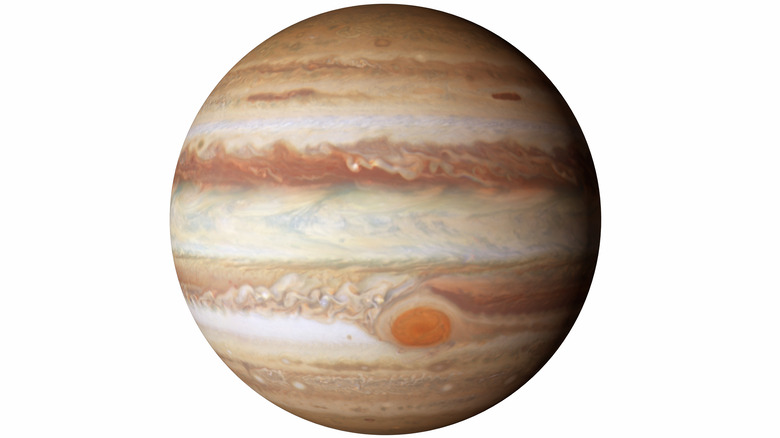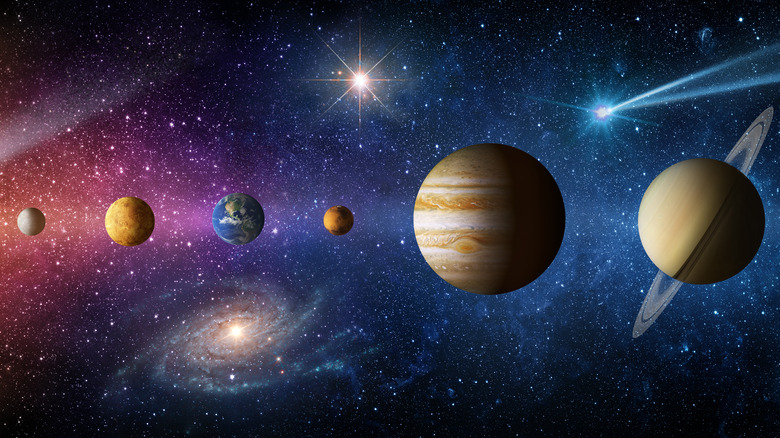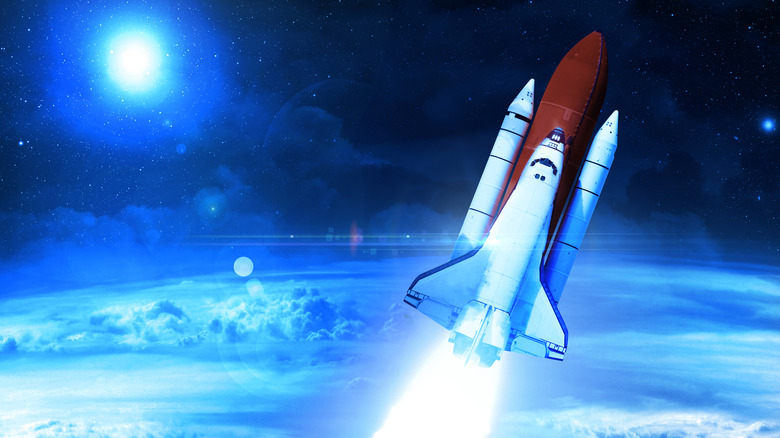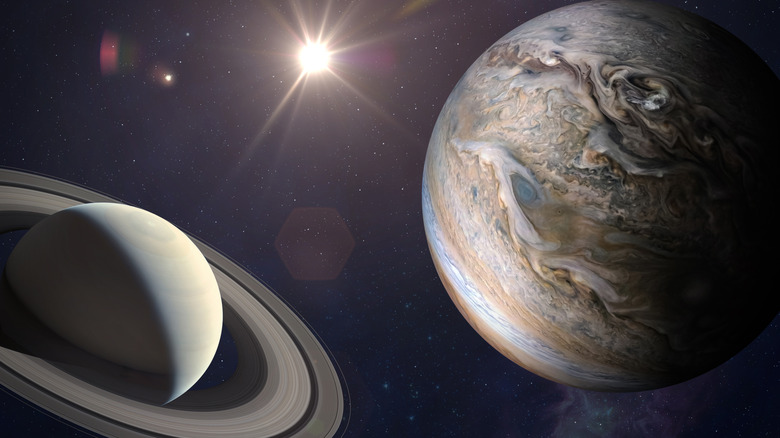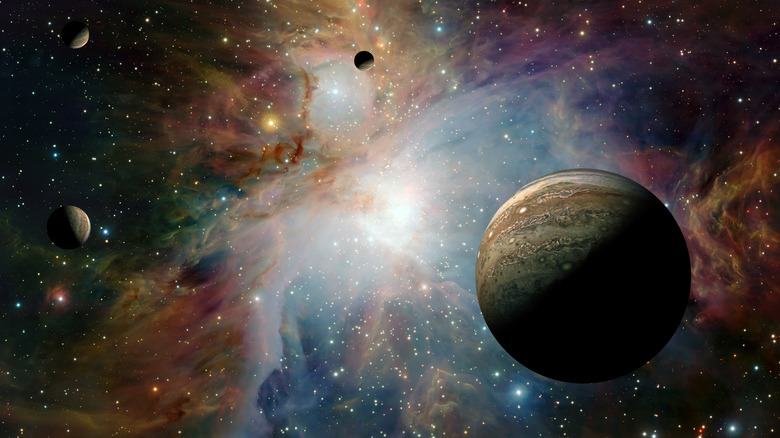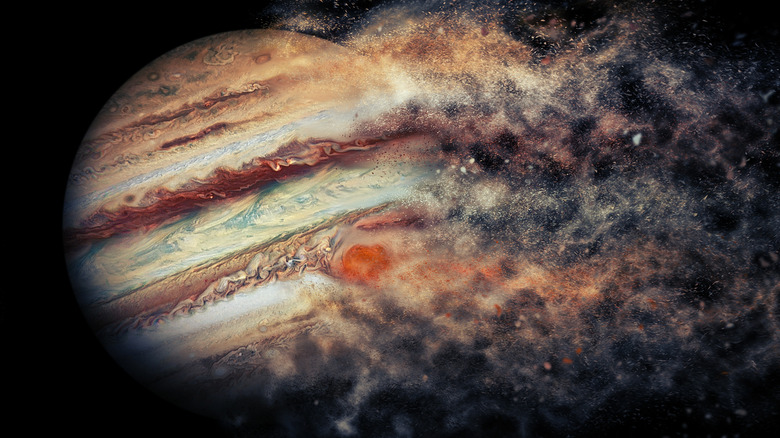Here's What Would Happen If Jupiter Suddenly Exploded
The solar system's largest planet, Jupiter, is so big that it more than doubles the collective mass of all the other planets combined. Jupiter lives up to its namesake, who was the ruler of all the Roman gods. In pictures, the planet looks colorful, even whimsical, with its stripes, colored clouds, and the famous red spot burning like a cyclops' eye almost mid-center. In reality, Jupiter cannot host life as humans know it; the atmosphere circulates with hydrogen, helium and ammonia. That great scarlet epicenter — itself larger than the earth — contains no haven, but rather a fierce storm that has pummeled the planet for more than 100 years (from NASA).
The large gas giant, the fifth planet from the sun, moves quickly for its size: it takes just 10 hours to complete an axis rotation, the fastest planet in our solar system. The swift spinning causes Jupiter's poles to flatten and its equator to push out, and helps create the planet's forceful magnetic fields, which are 14 times greater than our own planet's. This traps all kinds of substances from the planet's moons, such as sulfur dioxide when the moon Io experiences volcanic activity. Jupiter's magnetosphere also interacts with a steady solar wind to create a bow shock, a collection of radiation that can hurt a spaceship (via Universe Today).
As the third-brightest thing in our solar system (after our moon and Venus), you can see Jupiter with a naked eye. But what would happen if one day Jupiter disappeared? Poof, it was gone?
What if Jupiter disappeared?
If Jupiter vanished, the consequences might not seem obvious at first. While it does contain three times the mass of the solar systems' planets, gravity is dictated by the Sun. So planet movements should stay the same, and life as we know it could exist.
Sure, you might not see that bright star in the sky, and lots of astronomers and scientists might seek to explain Jupiter's sudden absence, but within a single news cycle even that flurry of questions shouldn't infiltrate the trending conversations on social media very long.
That's not to say nothing would change. Attentive sky watchers would see some minor adjustments to the planets' travels around the Sun, but big-picture moments won't happen. Because Jupiter's current magnitude does absorb space objects, such as asteroids and other assorted things, the Earth might see an uptick of impact of cosmic paraphernalia potentially hitting our landscape (from Science Focus). But no biggie, right? The Earth gets hit with at least a ton of space dust and particles yearly, according to NASA. What's a little more?
What if Jupiter caught fire?
Humanity has a way of messing things up. Look at some of the spectacular failures of humans: the sinking of the unsinkable RMS Titanic in 1912, or the Hindenburg disaster in 1937, when an airship caught fire and crashed. So it's not too hard to believe that a spaceship might cause some Jovian calamity.
Let's say a space vehicle comes too close when exploring the outskirts of Jupiter, and sets fire to the planet's 90%-hydrogen atmosphere. Within seconds, flames lick the planet. As a blockbuster movie, starring one of those "Chris" actors in superhero flicks (Pratt, Evans or Pine — take your pick), this might make a popcorn-pleasing flick. But in reality? The gas giant plants — Jupiter, Saturn, Neptune, and Uranus — are called that because of all the combustible hydrogen in the atmosphere. Could this become an apocalypse?
Nah ... that's not how things work in space. "The kind of ignition you're talking about is rapid oxidation," said Drake Deming, an astronomy professor at the University of Maryland, to How Stuff Works. "And there isn't enough free oxygen in the atmospheres of the outer planets to allow that to happen." The website also offered that if Jupiter were flammable, it would've already ignited, since other things have hit it, like the 1994 tango between the planet and comet Shoemaker-Levy 9, when no insurmountable firestorm happened. So unless a surplus of oxygen becomes available on Jupiter, the planet is not likely to be destroyed by fire.
What if Saturn and Jupiter crashed?
Another Doomsday scenario not likely to occur is two gas giants, like Saturn and Jupiter, colliding. While the chance of either planet moving from its usual orbital rotation seems nil, let's pretend for a moment that it happens. The resulting fallout depends on how the hit occurs. Head-on smash-ups could have several results, depending on the speed during impact. High speeds could destroy both planets, but a slight bump might merge the two together, uniting all their materials into a single, super-sized planet.
Oblique collisions (aka side hits), however, offer other outcomes. If the planet cores miss each other, than both Jupiter and Saturn will partly let go of the gaseous envelopes surrounding them. This will mix into space. If the cores hit at an angle, the planets might merge, but will also lose part of their gaseous envelopes. Oblique hits could also possibly change the planets' shape. One theory about Jupiter and Saturn's formation is that smaller gas giants collided and united, creating new, larger gas giants (from Science Focus).
Will these two giants ever collide in real life? Medium points out that studies on this are inconclusive, but orbits do change with disruptive forces, such as asteroids and stars moving closer to our solar system. So anything is possible.
Could Earth merge with Jupiter?
What could happen to Earth if it smashed into Jupiter? The gas giant already collided with another planet some 4.5 billion years ago. This one was 10 times the size of Earth, and while the impact changed Jupiter's core, the smaller planet itself no longer exists. At the time, Jupiter's gravity was 30 times greater and had an impact on other planets' orbits, pulling them into the gas giant. One of these was that planet, and it contained a silicate ice center when it hit Jupiter at 29 miles per second.
If Earth moved off course, it might travel to Jupiter in some 242 days. As the Earth journeyed across the solar system, daylight would fade. As our planet approached Mars, we'd get 50% less sunlight. After passing Mars, our planet's next celestial landmark is the asteroid belt. Once near Jupiter, the big planet's gravitational force would accelerate the Earth's speed to about 37 miles per second. How fast is that? Think about how fast an airplane flies and multiply that by 250 to feel how quickly our planet would move. If we're lucky, as our planet moves closer to its destination, the earth won't hit any of Jupiter's 79 moons.
Earth won't be like that icy planet, though — no impact to the core for us. Instead, our small planet would die in Jupiter's atmosphere. If it's any consolation, Jupiter would absorb the last of our essence into its ether (from What If Show).
And if Jupiter exploded...
Jupiter exploding is another scenario entirely. The energy an exploding Jupiter released would devastate earth. You can imagine that when something so huge blows, the consequences become dire. And you'd be correct. This would be the most horrific sci-fi movie ever. Gamma rays from the eruption could reach the Earth within 36 minutes, according to Stack Exchange. If the detonation occurred from Jupiter's center, its hydrogen (H1) and methyl (CH3) would infiltrate throughout the solar system, causing shock waves. Additionally, all sorts of radioactive emissions could flood the Earth.
Consequences would be fast and deadly for human life. As light and gamma rays released from the explosion hit satellites, they'd liquefy. When it penetrated the Earth's atmosphere any communications equipment still operating would stop working, said Stack Exchange. But you wouldn't have time to call anyone since the lethal substances brought in by the gamma rays, like neutrons and electromagnetic radiation, would take humans out in a handful of seconds. Not a happy outcome at all.
Meanwhile, those shockwaves mentioned earlier will keep traveling through the universe, hitting everything in their path. So say good-bye to the asteroid belt and several planetary moons. The gas giants could hurl closer to the sun or, even, move out of our solar system altogether, according to Colors New York. None of this seems appealing, so it's a good thing that nothing should make Jupiter explode. You can relax ... this scene is only in your favorite sci-fi/action adventure flick.
